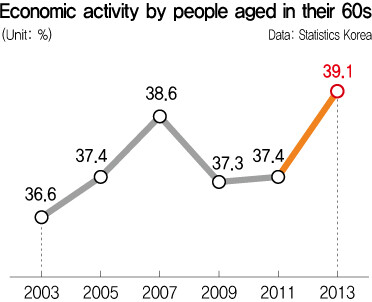hankyoreh
Links to other country sites 다른 나라 사이트 링크
In OECD, S. Koreans work longest after retirement

By Kim So-youn, staff reporter
South Koreans work longer after retirement than people in any other OECD member country, an OECD report shows.
Analysts said the phenomenon appeared to be the result of people being forced to continue working because of a lack of financial preparation for retirement.
According to an OECD report released on June 2, the “effective age of retirement” for South Korean men was 71.1 years in 2012, putting the country second only to Mexico, where the age was 72.3. South Korean women also ranked second, with an effective age of retirement averaging 69.8 years, just behind Chile’s 70.4.
The effective age of retirement indicates the age at which individuals fully leave the job market and stop engaging in income-earning activity.
Among men, only Mexico and South Korea had effective ages of retirement above 70 years, while Chilean men averaged 69.4 years and Japanese men 69.1 years. Men in Luxembourg had the earliest effective age of retirement, at 57.6 years. The OECD average was 64.2 years.
In the case of women, Mexico ranked third after Chile and South Korea, with an average age of 68.7 years, following by Iceland with 67.2 years. Belgium and Slovakia tied for the earliest age at 58.7 years. The OECD average was 63.1 years.
In South Korea, the official retirement age at which people leave the workforce and begin receiving a pension is 60 years. For males, the country had the largest gap of any OECD member country between the official and effective ages of retirement at 11.1 years - meaning that its male senior citizens work the longest after “officially” retiring. While Mexico had a higher effective age of retirement of 72.3 years, its official retirement age of 65 years is also higher, resulting in a smaller gap.
For South Korean women, the gap between the official retirement age of 60 years and the effective age of retirement of 69.8 years was 9.8 years, ranking them second only to women in Chile, who worked 10.4 years after retirement on average.
In Belgium, the effective age of retirement was 58.7 years and the official retirement age 65 years, meaning that women actually stop working 6.3 years before retirement age on average.
In contrast with Western countries with long-established pension systems that allow people a life of relative leisure after retirement, South Korea’s public pension and basic pension systems are still in their earliest stages, with few beneficiaries and inadequate payouts. Few of its senior citizens receive large enough severance packages or personal pensions to address their post-retirement financial needs. As a result, many are forced to continue working to earn a living after retiring.
Indeed, statistics show that the rate of economic activity among people 60 and older continues to grow. In 2013, the economic participation rate for those over 60 was 39.1%, up 2.5 percentage points from the 36.6% recorded a decade earlier in 2003.
Senior citizen poverty is another serious problem, with large numbers of ederly people working in jobs of generally low quality. According to Statistics Korea figures, around 1.12 million of South Korea’s 1.65 million wage earners over 60 in March 2014, or 68%, were working irregular jobs. South Korea’s 49.3% rate of senior citizen poverty is the highest in the OECD and more than three times the OECD average of 13.5%.
Please direct questions or comments to [english@hani.co.kr]

Editorial・opinion
![[Column] Park Geun-hye déjà vu in Yoon Suk-yeol [Column] Park Geun-hye déjà vu in Yoon Suk-yeol](https://flexible.img.hani.co.kr/flexible/normal/500/300/imgdb/original/2024/0424/651713945113788.jpg) [Column] Park Geun-hye déjà vu in Yoon Suk-yeol
[Column] Park Geun-hye déjà vu in Yoon Suk-yeol![[Editorial] New weight of N. Korea’s nuclear threats makes dialogue all the more urgent [Editorial] New weight of N. Korea’s nuclear threats makes dialogue all the more urgent](https://flexible.img.hani.co.kr/flexible/normal/500/300/imgdb/original/2024/0424/7317139454662664.jpg) [Editorial] New weight of N. Korea’s nuclear threats makes dialogue all the more urgent
[Editorial] New weight of N. Korea’s nuclear threats makes dialogue all the more urgent- [Guest essay] The real reason Korea’s new right wants to dub Rhee a founding father
- [Column] ‘Choson’: Is it time we start referring to N. Korea in its own terms?
- [Editorial] Japan’s rewriting of history with Korea has gone too far
- [Column] The president’s questionable capacity for dialogue
- [Column] Are chaebol firms just pizza pies for families to divvy up as they please?
- [Column] Has Korea, too, crossed the Rubicon on China?
- [Correspondent’s column] In Japan’s alliance with US, echoes of its past alliances with UK
- [Editorial] Does Yoon think the Korean public is wrong?
Most viewed articles
- 1‘We must say no’: Seoul defense chief on Korean, USFK involvement in hypothetical Taiwan crisis
- 2N. Korean delegation’s trip to Iran shows how Pyongyang is leveraging ties with Moscow
- 346% of cases of violence against women in Korea perpetrated by intimate partner, study finds
- 4[Column] Park Geun-hye déjà vu in Yoon Suk-yeol
- 5‘Weddingflation’ breaks the bank for Korean couples-to-be
- 6Will NewJeans end up collateral damage in internal feud at K-pop juggernaut Hybe?
- 7Amnesty notes ‘erosion’ of freedom of expression in Korea in annual human rights report
- 8[Interview] Dear Korean men, It’s OK to admit you’re not always strong
- 9Korean government’s compromise plan for medical reform swiftly rejected by doctors
- 10[Editorial] Japan’s rewriting of history with Korea has gone too far